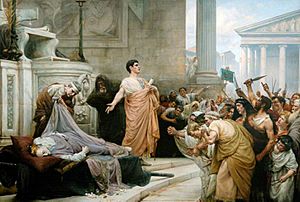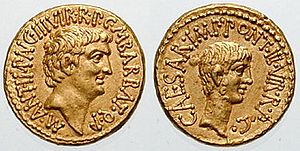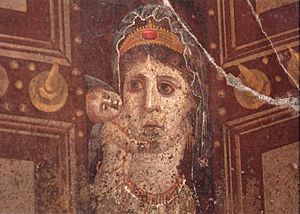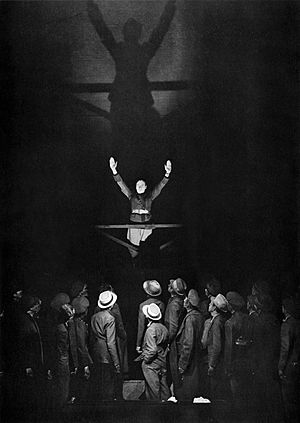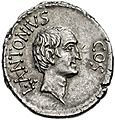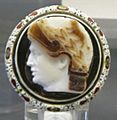Mark Antony facts for kids
Quick facts for kids
Marcus Antonius
|
|||||||||||
|---|---|---|---|---|---|---|---|---|---|---|---|
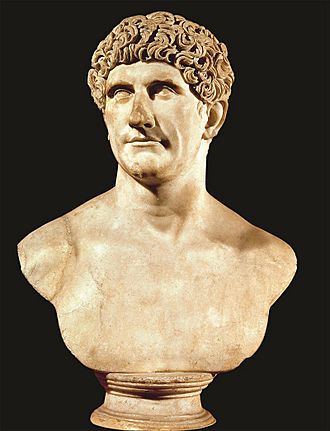
Flavian-era bust of Antony
|
|||||||||||
| Born | 14 January 83 BC | ||||||||||
| Died | 1 August 30 BC (aged 53) |
||||||||||
| Resting place | Unlocated tomb (probably in Egypt) | ||||||||||
| Nationality | Roman | ||||||||||
| Office |
|
||||||||||
| Spouse(s) |
|
||||||||||
| Children |
|
||||||||||
| Parent(s) | Marcus Antonius Creticus and Julia | ||||||||||
| Military career | |||||||||||
| Allegiance | Roman Republic Julius Caesar |
||||||||||
| Years | 54–30 BC | ||||||||||
| Battles/wars |
|
||||||||||
Marcus Antonius (born January 14, 83 BC – died August 1, 30 BC), often called Mark Antony in English, was a famous Roman politician and general. He played a very important part in changing the Roman Republic into the powerful Roman Empire.
Contents
Early Life and Education
Mark Antony was born in Rome on January 14, 83 BC. He was part of a Roman family called the Antonia gens. His father, also named Marcus Antonius, died when Antony was young. His father had been on a military trip to fight pirates.
Antony received a good education. He learned about philosophy, public speaking (rhetoric), and military strategies. These skills would be very useful later in his life.
However, Antony was known for being a bit wild. He spent a lot of money and ended up with a huge debt by the time he was 20. To escape his debts, he went to Greece. In Athens, he continued to study philosophy and rhetoric.
Military and Political Career
As a young man, Antony became involved in Roman politics and military life. These areas would shape his future.
In 57 BC, Antony joined the military. He served as a cavalry leader under Aulus Gabinius. He fought well in military campaigns in Judea and Gaul.
Later, he became part of the Second Triumvirate. This was a powerful political group that included Octavian and Lepidus. They ruled Rome after the death of Julius Caesar.
Relationship with Julius Caesar
Mark Antony and Julius Caesar were distant relatives. Antony's mother, Julia, was a third cousin of Caesar. This family link was important for Antony's early career. Antony was a strong supporter of Julius Caesar. He helped Caesar become very powerful in Rome.
Mark Antony was not involved in the killing of Julius Caesar. He was very sad and angry when Caesar died. He convinced one of the killers, Brutus, to let him speak at Caesar's funeral. Antony promised not to blame the killers in his speech.
However, Antony was very clever. He used his speech to turn the crowd against Brutus and the other killers. His famous words, "Friends, Romans, countrymen, lend me your ears; I come to bury Caesar, not to praise him," helped change public opinion.
After Caesar's death, Antony became one of the most important figures in the Roman Republic. He quickly gained a lot of political power.
Becoming a Triumvir
After Caesar was killed, Antony was the only Consul left. He gathered Caesar's loyal soldiers as his bodyguards. He then made the Senate give him control of the province of Cisalpine Gaul. This area was controlled by Brutus, one of Caesar's killers. Brutus refused to give it up. So, Antony attacked him in early 43 BC and surrounded him at Mutina.
The Roman Senate, encouraged by Cicero, spoke out against Antony. In January 43 BC, they gave Caesar's adopted son, Octavian, military power. Octavian was sent to help Brutus. In April 43 BC, Antony's forces were defeated at the battles of Forum Gallorum and Mutina. This forced Antony to retreat.
News then came that Brutus and Cassius were gathering an army to march on Rome. To stop Caesar's killers, Antony, Octavian, and Lepidus formed an alliance in November 43 BC. This group was known as the Second Triumvirate. Antony and Octavian defeated Brutus and Cassius at the Battle of Philippi in October 42 BC. After this victory, they divided the Roman world. Octavian went back to Rome, while Antony went to govern the eastern parts of the Republic. Lepidus took control of Spain and the province of Africa. The Triumvirate also punished their enemies.
Family Life
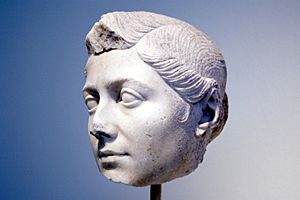
Mark Antony was married several times and had many children.
- Antony's first wife was Fadia, but not much is known about her.
- He then married his cousin Antonia Hybrida Minor between 54 and 47 BC. They had at least one daughter.
- In 46 BC, Antony married Fulvia. She was the widow of his political friend, Publius Clodius Pulcher. They had two sons together.
- After Fulvia died in 40 BC, Antony married Octavia Minor. She was the sister of his political rival, Octavian. This marriage was an attempt to make peace between Antony and Octavian. They had two daughters.
- Even though he was married to Octavia, Antony had a relationship with Cleopatra, the queen of Egypt. They had three children together. This relationship caused a lot of problems between Antony and Octavian. Antony's children with Cleopatra were Alexander Helios, Cleopatra Selene II, and Ptolemy Philadelphus.
Through his daughters with Octavia, Antony became the great-grandfather of Roman emperor Caligula. He was also the grandfather of emperor Claudius and an ancestor of emperor Nero. Through his children, Antony's family line connected to many important Roman figures and even to royal families in other kingdoms allied with Rome.
Rivalry with Octavian
Mark Antony and Octavian were allies at first, but their relationship got worse over time.
Antony's relationship with Cleopatra, the queen of Egypt, was a big reason for the tension between him and Octavian. Octavian saw Antony's alliance with Cleopatra as a danger to Rome. He accused Antony of not doing his duty as a Roman leader.
Antony's military trips in the east, which Cleopatra helped pay for, also seemed like a challenge to Octavian's power.
Antony's divorce from Octavia, Octavian's sister, was seen as a personal insult by Octavian. Octavia had often helped Antony and Octavian get along. Her divorce from Antony showed that their alliance was truly over.
Final Years and Death
The Triumvirate broke apart in 33 BC. Disagreements between Antony and Octavian led to a civil war in 31 BC. Antony's forces were defeated by Octavian's army at the Battle of Actium in 31 BC.
After his defeat, Antony took his own life by falling on his sword. It is said that he did not die right away. He was brought to Cleopatra's tomb, where he died in her arms on August 1, 30 BC, at 53 years old. Cleopatra buried him. Later, she also died by letting a venomous snake bite her.
William Shakespeare wrote a famous play called "Antony and Cleopatra" about their story.
Legacy
Mark Antony's legacy is quite complex. He was a skilled military leader and a powerful political figure. His relationship with Cleopatra and his rivalry with Octavian have made him famous throughout history.
People have debated and interpreted Antony's legacy for centuries. Some see him as a tragic hero, while others view him as a flawed politician.
When Antony died, Octavian became the undisputed ruler of Rome. In the years that followed, Octavian, who became known as Augustus after 27 BC, gained control of all important government and military roles. When Augustus died in AD 14, his power passed to his adopted son Tiberius. This marked the true beginning of the Roman Empire.
Artistic Portrayals
Mark Antony is a main character in many plays, films, and books:
- William Shakespeare's play Julius Caesar
- Julius Caesar (1950 film) (played by Charlton Heston)
- Julius Caesar (1953 film) (played by Marlon Brando)
- Julius Caesar (1970 film) (played by Charlton Heston again)
- Many works titled Antony and Cleopatra
- John Dryden's 1677 play All for Love
- Jules Massenet's 1914 opera Cléopâtre
- The 1934 film Cleopatra (played by Henry Wilcoxon)
- Orson Welles' 1937 play Caesar (played by George Coulouris)
- The 1953 film Serpent of the Nile (played by Raymond Burr)
- The 1963 film Cleopatra (played by Richard Burton)
- The 1964 film Carry On Cleo (played by Sid James)
- The 1983 miniseries The Cleopatras (played by Christopher Neame)
- The TV series Xena: Warrior Princess (played by Manu Bennett)
- In the video game Age of Empires: The Rise of Rome, Mark Antony is a short swordsman.
- The 1999 film Cleopatra (played by Billy Zane)
- The Capcom video game Shadow of Rome, where he is the main bad guy.
- The 2003 TV movie Imperium: Augustus (played by Massimo Ghini)
- The 2005 TV mini-series Empire (played by Vincent Regan)
- The 2005–2007 HBO/BBC TV series Rome (played by James Purefoy)
- The TV series Horrible Histories (played by Mathew Baynton and Tom Stourton)
- The 2006 BBC One docudrama Ancient Rome: The Rise and Fall of an Empire (played by Alex Ferns)
- As Cleopatra's guardian and a boss in the Xbox 360 game Dante's Inferno (2010).
- The 2021 TV series Domina (played by Liam Garrigan)
Novels
- In Colleen McCullough's Masters of Rome series (1990–2007), Antony is shown as a very flawed character.
- Margaret George's The Memoirs of Cleopatra (1997)
- Conn Iggulden's Emperor novels (2003–13)
- Robert Harris's Dictator (2015)
- Michael Livingston's The Shards of Heaven (2015)
Poetry
- Geoffrey Chaucer's 14th-century poem The Legend of Good Women.
- Lytle, William Haines (1826–1863), Antony and Cleopatra.
- Constantine P. Cavafy's poem The God Abandons Antony (1911), which imagines Antony's last moments.
Images for kids
-
Antony's brother Lucius, on a coin from 41 BC.
-
The Battle of Pharsalus, a key battle in Caesar's Civil War. Antony led the left side of Caesar's army.
-
A cameo carving of Mark Antony shown as Alexander the Great, around 40 BC.
-
A coin from 41 BC celebrating the Second Triumvirate. It shows Octavian and Antony.
-
Antony and Cleopatra (1883) by Lawrence Alma-Tadema, showing Antony meeting Cleopatra in 41 BC.
-
A map of the Parthian Empire. It shared a border with Rome along the Euphrates River.
-
A coin (denarius) showing both Octavian and Marcus Antonius from 41 BC.
-
A Roman bust of Mark Antony, from the late 1st century AD, in the Vatican Museums.
-
A sculpted head of an Alexandrian nobleman, possibly Mark Antony, from the Brooklyn Museum.
-
The Battle of Actium (1672) by Laureys a Castro (National Maritime Museum, London).
-
A coin (tetradrachm) of Marcus Antonius and Cleopatra VII of Ptolemaic Egypt from around 36 BC.
See also
 In Spanish: Marco Antonio para niños
In Spanish: Marco Antonio para niños


